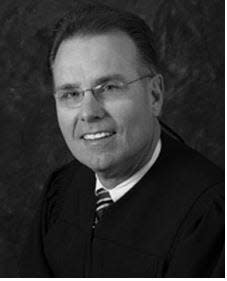Judges: We must set 'record straight.' Ohio Attorney General 'flatly misstating Ohio law'
- Oops!Something went wrong.Please try again later.
Reginald J. Routson is a judge in the Hancock County Common Pleas Court. Steven K. Dankof, Sr. is a judge in the Montgomery County Common Pleas Court
In a recent decision, the Ohio Supreme Court stated what has always been Ohio law: public safety is not a consideration when setting a cash bond.
Predictably, feigned outrage soon followed from the self-appointed law-and-order crowd who advance their false narrative that the future of our great state is at risk.
Get our app: Read stories on your phone with the Dispatch.com app, available for both Apple and Android devices
Why the hyperbole?
In our judgment, its purpose is to perpetuate one of the most significant institutional disparities in the criminal justice system: the misuse of cash bail.

Recently, Ohio’s top law enforcement officer, Attorney General Dave Yost, wrote a misleading Dispatch guest column, flatly misstating Ohio law, to support a change to Ohio’s Constitution to supplant the Supreme Court’s ruling.
More: Yost: 'Fresh helping of injustice' served when violent criminals out on low bail reoffend
For us, this was the final straw.
As two trial judges with combined judicial experience of 44 years and who have made thousands of bail decisions, we are compelled to set the record straight
There is no correlation between cash bond and public safety
Time-honored Ohio law preventing the use of cash bail to address public safety makes perfect sense. Any legitimate criminal justice expert will readily admit there is absolutely no empirical evidence even suggesting a correlation between cash bail and public safety.
More: Ohio Supreme Court justice: Judges being hit by 'insidious' attacks from ax grinders
Yost wrongly argues that, if a person released on a high cash bail misbehaves, the posted monetary bail can be forfeited.

This is false.
Cash bail can only be forfeited if an offender fails to appear at subsequent court proceedings. There is simply no monetary incentive to behave while on bond, and thus no connection between money and safety.
Don't miss out on the Conversation: Sign up for our opinion newsletter

The current system merely guarantees that those perceived as “evil”, but poor, remain in jail, while those perceived as “evil” but wealthy can secure their release, free to commit new crimes – a story told and retold.
And so we ask, how are victims of violent crime protected by Yost’s so-called “solution?"
Violent defendants can already be held with out bail
Worse yet, the self-appointed “defenders” of Law & Order surely know that for over twenty years, a rarely invoked process has been in place to hold potentially violent defendants, rich and poor, without bail. So why not use the system already in place? The answer is simple and tragic: It takes time and effort.
More: 'Fear-mongering' prosecutors stuck in the past, bail system dangerous to our health| Opinion
What's the pretext?
Sadly, all too many prosecutors and judges do not want to take the time to ensure a constitutionally permissible result, preferring instead to turn a blind (or winking eye) to what the law commands. At least Yost candidly admits that he supports the blatant circumvention of Ohio’s constitutional protections in the name of expediency.
Yost and others claim that such mandated hearings would, somehow, “victimize” alleged victims.
This claim is entirely speculative because few such hearings are pursued by prosecutors or conducted by judges. As judges who actually conduct “no bail” hearings under existing Ohio law, this has absolutely not been our experience.
And other states using pretrial detention procedures report no widespread victimization.
Yost and others also argue that Ohio’s existing “no bail” statute doesn’t reach enough serious crimes. Covered under existing Ohio law are Aggravated Murder, Murder, all Felony 1s and 2s, Felony OVI, etc.
Certainly, the Legislature should revisit the current statute and consider adding other serious crimes implicating public safety, a process that may be overdue.
Regardless of what you hear, this one decision has not jeopardized public safety. If prosecutors and judges do their constitutionally mandated jobs, public safety will actually be given top priority instead of paid naked political lip service.
There is no need to amend Ohio’s Constitution.
Reginald J. Routson is a judge in the Hancock County Common Pleas Court. Steven K. Dankof, Sr. is a judge in the Montgomery County Common Pleas Court
This article originally appeared on The Columbus Dispatch: Ohio does not need constitutional amendment linking bail to public safety

